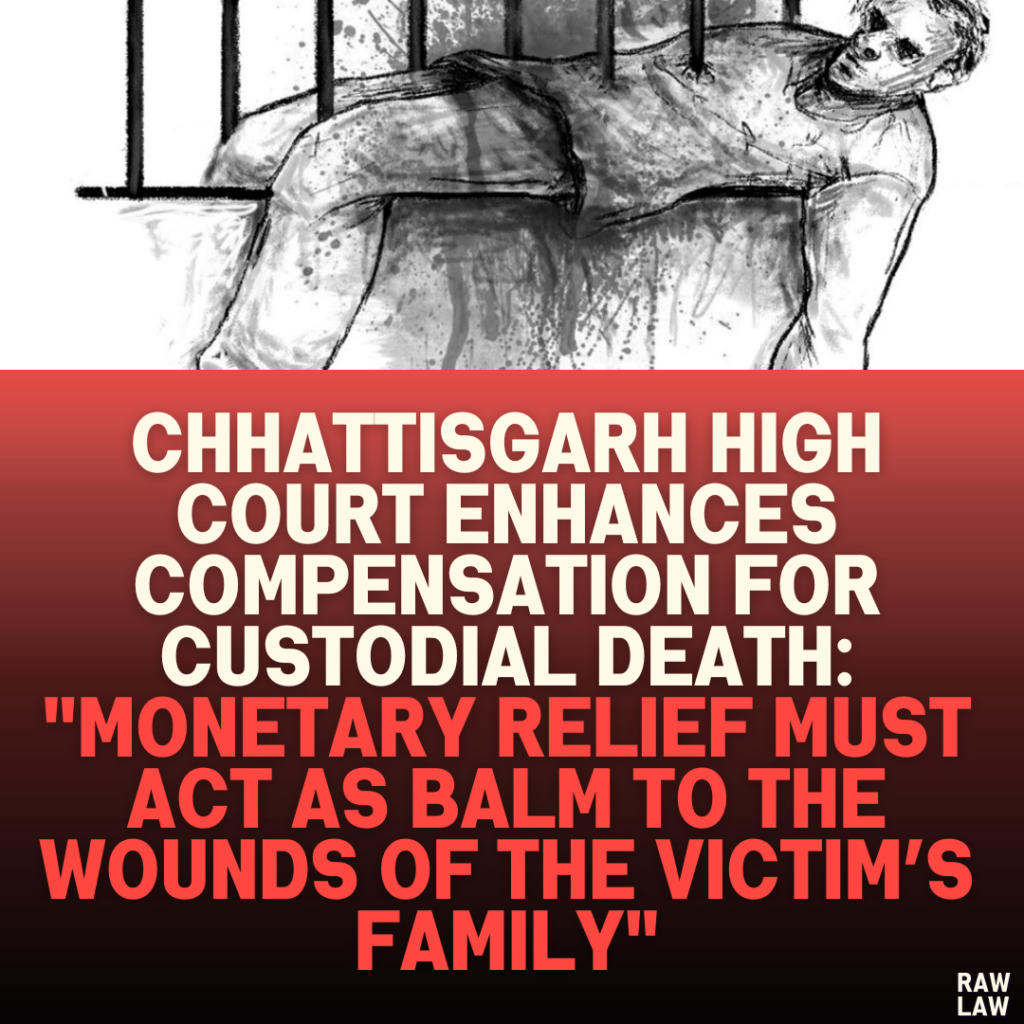Court’s Decision:
The High Court of Chhattisgarh enhanced the compensation for the custodial death of the petitioner’s son from ₹5,00,000 to ₹15,00,000. The Court directed the State to pay the additional amount within two months and allowed the government to recover this amount from the erring jail officials through due process. The Court observed that custodial deaths strike at the very foundation of the rule of law, necessitating adequate compensation to the victim’s family as both a remedial and deterrent measure.
Facts of the Case:
- The petitioner’s son, aged 18, was an undertrial prisoner lodged in District Jail, Dhamtari. He was facing trial for various offenses.
- On August 31, 2022, the son died by suicide in the jail. A judicial inquiry revealed that he had been subjected to continuous physical and mental torture by a jail official, Mukund Ram Ratnendra.
- The inquiry further stated that other jail staff failed to act, thereby contributing to the incident.
- The petitioner alleged that her son was tortured to such an extent that he was driven to take his own life, and justice was sought against the jail official.
- The National Human Rights Commission (NHRC) directed the State to pay ₹5,00,000 to the petitioner, which she received. Dissatisfied with the quantum of compensation, the petitioner sought an enhancement in the High Court.
Issues:
- Whether the compensation of ₹5,00,000 awarded to the petitioner is adequate in light of the custodial death and the loss suffered.
- Whether the petitioner is entitled to enhanced compensation, and if so, to what extent.
Petitioner’s Arguments:
- The petitioner contended that her son, the breadwinner of the family, died due to the torturous conduct of jail officials.
- She argued that ₹5,00,000 was grossly inadequate given the magnitude of the loss and the breach of fundamental rights under Article 21 of the Constitution.
- Referring to precedents such as Nilabati Behera v. State of Orissa and DK Basu v. State of West Bengal, the petitioner highlighted the need for adequate compensation in cases of custodial violence.
- She sought a total compensation of ₹15,00,000, emphasizing that this would provide some solace for the irreparable loss caused to her family.
Respondent’s Arguments:
- The State contended that the compensation of ₹5,00,000 was reasonable and in compliance with the NHRC’s directive.
- The respondents argued that the petitioner had already accepted the compensation and should pursue a civil suit if dissatisfied.
- They maintained that the awarded amount was sufficient given the circumstances.
Analysis of the Law:
- Article 21 of the Constitution: The Court reiterated the fundamental right to life and liberty guaranteed under Article 21. The custodial death represented a gross violation of this right, demanding remedial action.
- Compensation as a Remedy: The Court emphasized that monetary compensation serves not only as redress for the victim’s family but also as a deterrent against future violations by State authorities.
- Focus on Compensatory Justice: The Court highlighted that compensation should focus on the harm caused to the victim and their family rather than being punitive.
Precedent Analysis:
- Nilabati Behera v. State of Orissa (1993): This case established that monetary compensation could be awarded for violations of fundamental rights by State authorities.
- DK Basu v. State of West Bengal (1997): The Supreme Court emphasized the State’s responsibility to ensure protection against custodial torture and the necessity of compensating victims.
- Ramkhilawan Dansena v. State of Chhattisgarh (2019): In this case, the Chhattisgarh High Court awarded ₹15,00,000 for a custodial death, setting a benchmark for determining compensation in similar cases.
The Court relied on these precedents to justify enhancing the compensation amount to ₹15,00,000.
Court’s Reasoning:
- The Court observed that the petitioner’s son was a young individual and the sole breadwinner of the family. His untimely death deprived the petitioner of financial and emotional support.
- It held that ₹5,00,000 was insufficient to address the petitioner’s suffering and the irreparable loss of her son.
- The Court stated that custodial deaths undermine the rule of law and violate basic human rights. Compensation acts as both a remedy for the victim’s family and a deterrent against State misconduct.
- It noted that the State, as the custodian of prisoners, bears the responsibility for ensuring their safety and well-being.
Conclusion:
The Court enhanced the compensation to ₹15,00,000, ordering the State to pay the additional amount within two months. It allowed the State to recover the amount from the erring jail officials by following due process of law.
Implications:
- Accountability for Custodial Violence: The judgment underscores the need for accountability in cases of custodial violence.
- Precedent for Enhanced Compensation: By enhancing the compensation, the Court reinforced the principle of compensatory justice in cases involving fundamental rights violations.
- Deterrence Against Misconduct: The ruling acts as a deterrent for State authorities, emphasizing the importance of protecting prisoners’ rights and dignity.
This decision highlights the judiciary’s commitment to upholding human rights and ensuring that victims’ families receive adequate relief for the loss of life caused by custodial misconduct.




Pingback: Delhi High Court Upholds Restriction of Section 54F Exemption to a Singular Residential Unit: "A Residential House" Cannot Be Interpreted as Multiple Distinct Flats - Raw Law